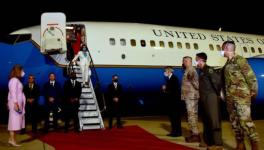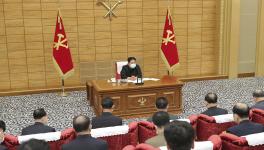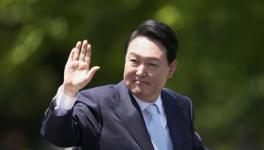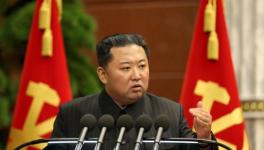US-based Korean activists call for peace after 70 years of war
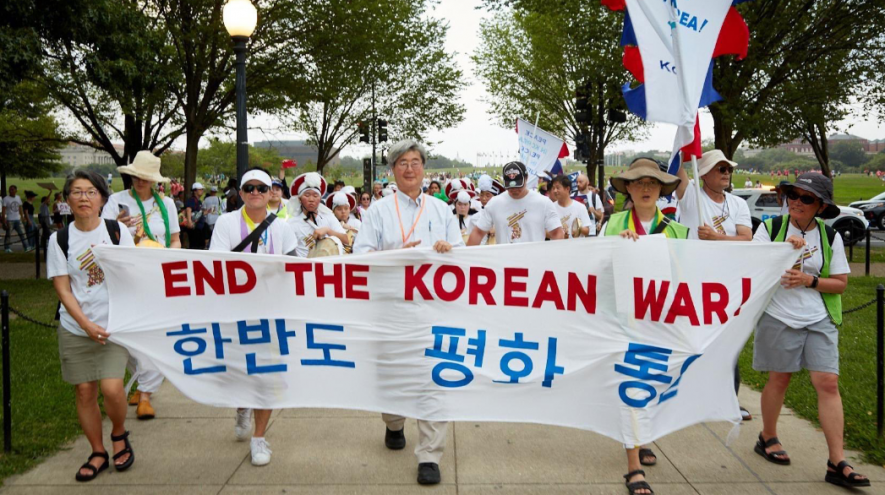
Activists march in Washington DC on July 27, in recognition of the 70th anniversary of the armistice in Korea (Photo: Women Cross DMZ via Twitter)
On Thursday, July 27, US-based Korean peace activists rallied outside the US Department of State in Washington, DC to call for an end to the travel ban of US passport holders traveling to North Korea (officially known as Democratic People’s Republic of Korea – DPRK). Activists also delivered 1,000 individually signed postcards and an open letter endorsed by 62 organizations addressed to President Joe Biden and Secretary of State Antony Blinken, also calling on the US to end the travel ban.
This action comes in the context of a week of workshops, rallies, and meetings with lawmakers organized by US-based peace groups such as Women Cross DMZ, Nodutdol for Korean Community Development, CODEPINK, and Korea Peace Now. Activists are calling on the US government to end the 70-year-long Korean War and make peace with North Korea.
“Thousands of Korean Americans with family members across the DMZ have not seen or heard from their loved ones in decades,” said Cathi Choi, Director of Policy and Organizing at Women Cross DMZ. Over 100,000 people in the US have family in North Korea who they are unable to visit due to travel restrictions. Former US President Donald Trump imposed this travel ban in 2017, and the Biden administration has had two chances to end it (it is up for renewal each year in August). Thus far, the Biden administration has chosen to keep the ban in place.
“President Biden pledged, days before his election, ‘to reunite Korean Americans separated from loved ones in North Korea for decades.’ He has a moral duty to follow through on that pledge,” Choi said. “This collection of postcards speaks to the widespread will of the American public to see a swift end to this draconian travel ban.”
Activists conducting peace-building work have also been unable to continue due to the travel ban. Nodutdol, for example, has had to halt its deliveries of medical aid to hospitals and its work helping Koreans with US citizenship unite with North Korean family members.
“In-person engagements are one of the most effective ways to work toward normalizing relations and building mutual trust internationally,” stated the Democratic Socialists of America International Committee. “The Trump administration’s decision over 5 years ago to end all travel to North Korea, and Biden’s continued support for this policy, severely undermines the decades-long work Korean peace organizations have done to build towards ending the Korean War.”
To Korean activists, the genocidal US war against Korea, which began in 1950 took millions of Korean lives over the course of three years, never truly ended. On July 27, 1953, an armistice ended hostilities and created a demilitarized zone (DMZ) between what became “North” and “South” Korea. But according to Christine Ahn, the Executive Director of Women Cross DMZ, “The armistice… was only a ceasefire. It did not settle the Korean conflict and ongoing division of the peninsula, which remains ongoing to this day. It’s why the United States still maintains 28,500 troops in South Korea, why the largest US overseas military base can be found in South Korea, and why the United States has operational control of South Korea’s military during any potential wartime.”
The increasing US militarism in South Korea has generated a mass anti-militarism movement in South Korea, especially against THAAD, or Terminal High Altitude Area Defense. THAAD is a controversial missile defense system that the US installed in South Korea in response to North Korean missile testing. The administration of President Yoon Suk Yeol was humiliated earlier this year when leaked US intelligence documents revealed that Washington had been violating South Korean sovereignty by spying on the country (a key US ally) and likely browbeating the administration into indirectly supplying weapons to Ukraine.
Tensions with North Korea have also been escalating, with the US only adding fuel to the fire. Christine Ahn, writing in In These Times, details the past 12 months of conflict including North Korea’s testing of missiles in reaction to the installation of THAAD. North Korea now has proven its ability to potentially overwhelm THAAD. US and South Korean joint military exercises have also inflamed tensions. In November 2022, the US sent an aircraft carrier to South Korea for the first time in years for a very explicit purpose: “to join other military vessels in a show of force intended to send a message to North Korea.”
North Korea recently threatened potential nuclear retaliation in response to the US sending two nuclear submarines to South Korea for the first time since 198.
Brian Becker, Executive Director of the US-based ANSWER (Act Now to Stop War and End Racism) Coalition, stated, “The US government is pursuing a profoundly dangerous policy of brinksmanship in Korea, carrying out massive military exercises that simulate an invasion of the North… If people from the United States could travel to North Korea, then they could see for themselves that the demonization of the country is based on lies and that people in the DPRK—like most people everywhere—desire nothing more than peace and mutual respect.”
Get the latest reports & analysis with people's perspective on Protests, movements & deep analytical videos, discussions of the current affairs in your Telegram app. Subscribe to NewsClick's Telegram channel & get Real-Time updates on stories, as they get published on our website.













